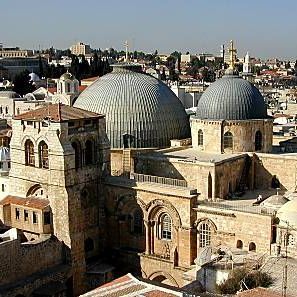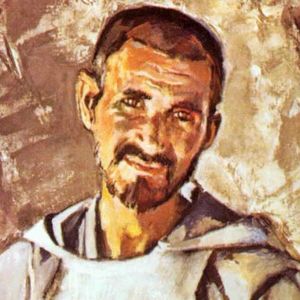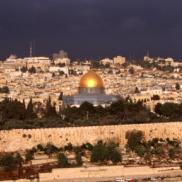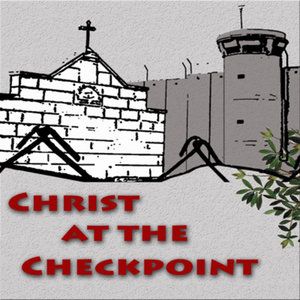


Articles on the life, worship, theology, customs and activities of the various churches and Christian communities in Israel (Catholic, Orthodox, Protestant, and Messianic).
 On the one hand, there is the Christian message of unconditional love and its emphasis on self-sacrifice at the hands of those who hate you unjustly: "No one can have greater love than to lay down his life for his friends." On the other hand, there is the logic of war: you want to liquidate those who hate you to the point of murdering your nation by all possible means, preferably the most horrific ones. What I identify as problematic is the conflation of these two logics - a confusion that I have a hard time not considering to be deliberate.
On the one hand, there is the Christian message of unconditional love and its emphasis on self-sacrifice at the hands of those who hate you unjustly: "No one can have greater love than to lay down his life for his friends." On the other hand, there is the logic of war: you want to liquidate those who hate you to the point of murdering your nation by all possible means, preferably the most horrific ones. What I identify as problematic is the conflation of these two logics - a confusion that I have a hard time not considering to be deliberate.
 While most Evangelical Protestants are generally friendly to the Jewish people and the State of Israel, there is a small band of Evangelical pastors and professors who want to line up all Evangelicals unilaterally on the Palestinian side. The most egregious example may be Anglican vicar Stephen Sizer, whose has chummed up with the likes of Naturei Karta and Iranian President Ahmadinejad. But Gary Burge probably wields the greater influence.
While most Evangelical Protestants are generally friendly to the Jewish people and the State of Israel, there is a small band of Evangelical pastors and professors who want to line up all Evangelicals unilaterally on the Palestinian side. The most egregious example may be Anglican vicar Stephen Sizer, whose has chummed up with the likes of Naturei Karta and Iranian President Ahmadinejad. But Gary Burge probably wields the greater influence.
 In the plan of God’s rule over history, Israel has a great role to play in preparing the nations for the return of the Messiah in glory. In the twentieth century began the great epochal change preparing mankind for the conclusive event of history: the final coming of the Kingdom of God, for which all Christians pray every day, saying: Thy Kingdom come!
In the plan of God’s rule over history, Israel has a great role to play in preparing the nations for the return of the Messiah in glory. In the twentieth century began the great epochal change preparing mankind for the conclusive event of history: the final coming of the Kingdom of God, for which all Christians pray every day, saying: Thy Kingdom come!
 Two years after its publication, the authors of the "Kairos Palestine" document held an anniversary conference in Bethlehem, constituting themselves a tribunal before which to arraign all the churches of the world for not showing enough enthusiasm for their original document.
Two years after its publication, the authors of the "Kairos Palestine" document held an anniversary conference in Bethlehem, constituting themselves a tribunal before which to arraign all the churches of the world for not showing enough enthusiasm for their original document.
 For over two decades, parts of the Christian world have been bemused by the writings of self-styled "Palestinian Christian theologians." Since their brightest lights are Protestant pastors, they are minor figures among the overwhelmingly Orthodox and Catholic faithful of the Holy Land. But they are strangely popular in Liberal Protestant circles abroad and especially beloved of church bureaucrats.
For over two decades, parts of the Christian world have been bemused by the writings of self-styled "Palestinian Christian theologians." Since their brightest lights are Protestant pastors, they are minor figures among the overwhelmingly Orthodox and Catholic faithful of the Holy Land. But they are strangely popular in Liberal Protestant circles abroad and especially beloved of church bureaucrats.
 A “bird’s eye view” of the Latin Catholic Church in the Holy Land, including the Latin Patriarchate of Jerusalem and the Franciscan Custody of the Holy Land.
A “bird’s eye view” of the Latin Catholic Church in the Holy Land, including the Latin Patriarchate of Jerusalem and the Franciscan Custody of the Holy Land.
 The Orthodox churches count among them some of the oldest churches in Christianity. Because they almost all originated in the east they are usually known as the "eastern" churches.
The Orthodox churches count among them some of the oldest churches in Christianity. Because they almost all originated in the east they are usually known as the "eastern" churches.
 The Hidden Roots of the Crisis of the Church in the Holy Land: In the troubled Holy Land, divided and torn by conflict, local Church leaders and Christians of all colors often claim to speak a tireless message of justice, reconciliation and peace. If only more people would listen to this message - so they claim - it would surely dramatically improve the prospects for peace between the conflicting parties in the region. But is this true?
The Hidden Roots of the Crisis of the Church in the Holy Land: In the troubled Holy Land, divided and torn by conflict, local Church leaders and Christians of all colors often claim to speak a tireless message of justice, reconciliation and peace. If only more people would listen to this message - so they claim - it would surely dramatically improve the prospects for peace between the conflicting parties in the region. But is this true?
 There has been much excellent academic study of the history of Christianity in the land of its birth. It could fill a whole library. In recent years, however, all that fine work has been eclipsed by the myth, created by the so-called "Palestinian narrative," of Palestinian Christianity.
There has been much excellent academic study of the history of Christianity in the land of its birth. It could fill a whole library. In recent years, however, all that fine work has been eclipsed by the myth, created by the so-called "Palestinian narrative," of Palestinian Christianity.
 Catholics for Israel are highly aware of the precarious and difficult situation you find yourselves in. We are not against you by calling ourselves Catholics for Israel. It is precisely the concern for the situation you are in and the complexity of your situation that is motivating us to address and speak out those things that today most Catholics are afraid to even think about.
Catholics for Israel are highly aware of the precarious and difficult situation you find yourselves in. We are not against you by calling ourselves Catholics for Israel. It is precisely the concern for the situation you are in and the complexity of your situation that is motivating us to address and speak out those things that today most Catholics are afraid to even think about.
 The self-styled “Kairos Palestine” document was launched in Bethlehem on December 11,2009 by a panel chaired by the former Latin Patriarch of Jerusalem,Michel Sabbah. The document is meant to mobilize churches worldwide in a program of boycotts, divestment and delegitimization directed at the State of Israel.
The self-styled “Kairos Palestine” document was launched in Bethlehem on December 11,2009 by a panel chaired by the former Latin Patriarch of Jerusalem,Michel Sabbah. The document is meant to mobilize churches worldwide in a program of boycotts, divestment and delegitimization directed at the State of Israel.